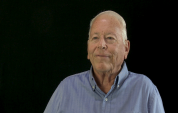2:27 | Helicopter pilot Dave Oliver was decorated in Vietnam but some things he heard from higher ups while there, and that he heard in documentaries later on, convinced him that the leadership had been badly flawed.
Keywords : Dave Oliver helicopter pilot Vietnam Saigon Da Nang

College graduate Dave Oliver couldn't get hired because the employers knew he might get drafted. Rather than fight it, he went to enlist and asked the recruiter what pays the most money in the military. Flying airplanes, came the answer. He'd never even been in an airplane, but he decided that was what he was going to do.
He didn't have the "hands" for flying jets, but Dave Oliver found that he had the right skills to fly a helicopter. It was a different kind of flying, which required both hands and feet for control. He became a rescue and recovery pilot, based first in North Carolina and then in the Philippines.
The first daily chore for helicopter pilot Dave Oliver was to fly the perimeter of Clark AFB to see where the Filipinos had stolen sections of the fence. His main job was to fly for the survival school, which was using the amazing talents of the local Negritos as an aggressor force. He also had to ferry hot headed generals to and from the golf course.
Dave Oliver thought he was going to die right then and there before he even had a chance to pilot a helicopter. It was the unluckiest of arrival dates in Vietnam, the night the infamous Tet Offensive began. When he emerged from the bunker, he was sent to Da Nang, where his job was rescue and recovery.
When helicopter pilot Dave Oliver ordered paint from Sears for his room, the supply sergeant set the naive newcomer straight. We can get whatever you need. His main job flying out of Da Nang was rescuing personnel on the ground, but there were other things to do, like bringing nurses to the party.
Rescue and recovery pilot Dave Oliver would often have to orbit off the coast of North Vietnam, waiting for a possible call during air strikes. His observations of these operations led him to question the intelligence and motivation of those leading the war effort.
The Air Force rescue crews flying the big helicopters known as the Jolly Green Giants began to get respect among the pilots of other services because they excelled at retrieving downed airmen. Pilot Dave Oliver was on one such mission, which was going badly, when the commander asked if was he willing to go in without waiting for backup. The situation was dire for the men on the ground so the answer was affirmative. He would be awarded the Silver Star for this action.
Air rescue pilot Dave Oliver recalls a mission which could have easily been fatal due to a shoulder fired rocket. On another, he had to land in North Vietnam and break out the M-16 to engage in a little ground combat.
In Vietnam, helicopter pilot Dave Oliver and his roommate suspected that the mama-san who was cleaning their room was relieving them of some of their cash. They weren't wrong.
The war was getting hotter, but Dave Oliver's Vietnam tour was over and he headed to a plum post in Hawaii. The rescue and recovery pilot spent the next seven years there retrieving satellite film canisters, among other things. He finished up his Air Force career in the Philippines, where he'd served at the beginning.
For Dave Oliver, it was a great career in the Air Force. He encourages everyone to spend some time serving their country. When he took his first trip to Washington after the War, he did not anticipate the emotional experience that visiting the Vietnam Memorial would be. Then he saw a friend's name.